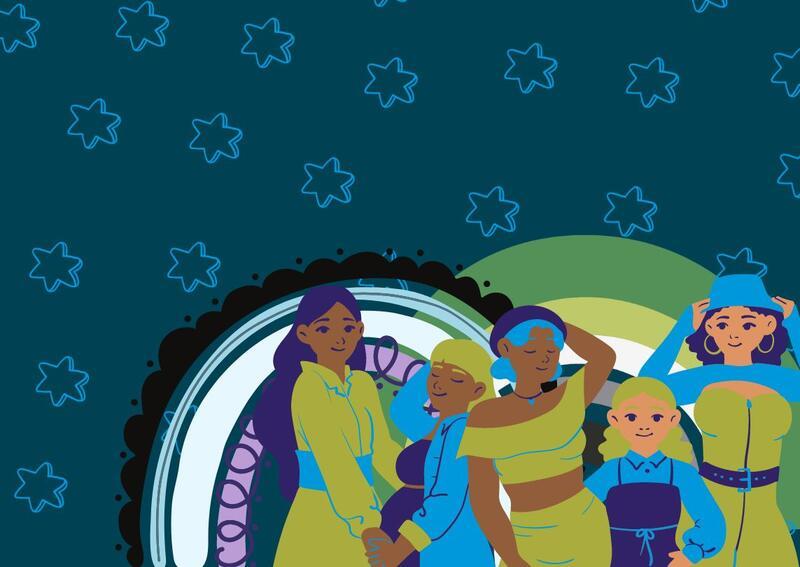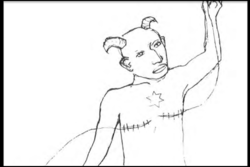What "Be Fruitful and Multiply" Means for Ace and Aro Jews
Pride. Nowadays, this word, and the accompanying pride month, bring to mind rainbows plastered on billboards, parades with music, community, and authenticity, and the (sometimes laughable) pride merchandise by various corporations. Pride holds so much beauty and connection for many, and at its core, aims to fight oppressive systems and offer visibility and empowerment to all queer identities and communities. Dominant American media, however, has undoubtedly narrowed the scope of the month. Many communities, identities, and individuals aren't seen, included, or welcomed into this supposed gathering of inclusion, empowerment, and rebellion—one such group being the aromantic and asexual community.
To get some definitions out of the way: asexuality (ace) is the umbrella term for people who experience little to no sexual attraction, and aromanticism (aro) is the same for romantic attraction. Both are spectrums comprised of individuals with vastly different experiences, intersecting or not. Asexuality and aromantism are wildly misunderstood, with many misconceptions equating the identities to celibacy, or assuming they are as a choice. While visibility and education for these communities have been expanding, they're often forgotten in discussion of queer identity and tend to require more explanation and justification.
There is no doubt that these identities can be immensely isolating, scary, and painful. As we’ve seen in conversations surrounding media, amatonormativity, hookup culture, and more, romance and relationships are seen as a universal priority; it can be so difficult to realize that you can’t envision yourself within these societal standards of attraction or partnership. Especially without having the vocabulary or context to understand these identities, many ace or aro kids grow up feeling isolated from others who are constantly discussing crushes, dates, and attraction. Even with the understanding of these identities, it can still be extremely painful to begin to accept. Given the lack of aro and ace representation, the harmful discourse isolating these communities from the larger LGBTQ+ community, and the incredible uncertainty of what it all means for the future, it can be near impossible to grow into these identities.
The loneliness and isolation that can come with aro and ace identities tend to be amplified within the larger context of Judaism. Jewish texts and spaces tend to be incredibly focused on partnership, marriage, and having kids. The very first commandment of the Torah is “be fruitful and multiply,” and many see the commandment of reproduction to be one of the most important mitzvot. Throughout history, we see this emphasis on reproduction in the Jewish community, especially with the notion of carrying on the religion after all the violence and persecution we've faced. This idea has made its way into the fabric of many Jewish communities, notably Jewish youth groups and overnight camps, where toxic hookup culture and heteronormativity are practically inescapable.
However, I find immense hope in the idea of shifting our perception of “being fruitful and multiplying” and what it can mean for our identities and the future. New Voices writer Nat El-Hai offers a beautiful framework of looking at this concept through queer and Jewish timelines: being fruitful and multiplying not by reproducing, but rather by embodying your true self beyond societal expectations and embracing what that can bring to your community. El-Hai explains that “once you are able to find internal and community support, you can share it with others and the cycle of queer and Jewish fruitful multiplication is ready to begin again.” With this understanding, we see that queerness, asexuality, and aromanticism don't take away our ability to fulfill this mitzvah, and in some ways, they actually open up our world. Queerness offers a framework to transcend society’s strict boundaries and understand the multitudes of diverse opportunities available once we begin doing so. Queerness is radical. Living authentically is radical.
We can use aro and ace identities as starting points for growth. For embracing life beyond the typical milestones and timelines that are pushed onto us. For deeply connecting with friends and family; for coming to understand what love truly is, beyond cheesy Hallmark movies or Valentine’s Day Instagram stories. Queerness and pride were never just about parades and relationships. They are an act of resistance, an offering of community, and a release from the narrow boxes we’re expected to fit ourselves within.
And to any young aro or ace kids, to anyone just finding or resonating with these identities: I can’t promise you that it’s never going to not feel absolutely terrifying. The overwhelming feeling of otherness. The shattering desire to be normal—to experience crushes and relationships and love. But I need you to know––need us to know––to know that it’s going to be ok. One day, we’re going to have it all figured out. We’re going to receive unconditional love and support from our family and friends, from the queer community. We’re going to be able to share our identity as a strength, and as a beautiful facet of ourselves. We’re going to form meaningful connections outside of typical romantic relationships but will still experience all the love and light we deserve. These identities are a source of beauty, strength, and wonder. I love you.
This piece was written as part of JWA’s Rising Voices Fellowship.







